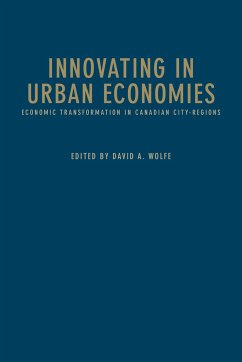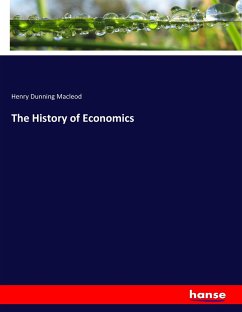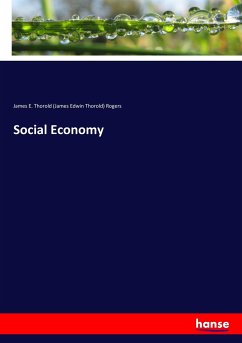Innovating in Urban Economies
Economic Transformation in Canadian City-Regions
Herausgeber: Wolfe, David A
Innovating in Urban Economies
Economic Transformation in Canadian City-Regions
Herausgeber: Wolfe, David A
- Gebundenes Buch
- Merkliste
- Auf die Merkliste
- Bewerten Bewerten
- Teilen
- Produkt teilen
- Produkterinnerung
- Produkterinnerung
With case studies examining cities of all sizes, from Toronto to Moncton, Innovating in Urban Economies analyzes the impact of size, location, and the regional economy on innovation and knowledge in Canada’s cities
Andere Kunden interessierten sich auch für
![The History of Economics The History of Economics]() Henry Dunning MacleodThe History of Economics43,90 €
Henry Dunning MacleodThe History of Economics43,90 €![Political economy for beginners Political economy for beginners]() Millicent Garrett FawcettPolitical economy for beginners21,90 €
Millicent Garrett FawcettPolitical economy for beginners21,90 €![Principles of Monetary Legislation Principles of Monetary Legislation]() Richard WebsterPrinciples of Monetary Legislation20,90 €
Richard WebsterPrinciples of Monetary Legislation20,90 €![A Treatise on Money And Essays on Monetary Problems A Treatise on Money And Essays on Monetary Problems]() Joseph Shield NicholsonA Treatise on Money And Essays on Monetary Problems30,90 €
Joseph Shield NicholsonA Treatise on Money And Essays on Monetary Problems30,90 €![The Scope and Method of Political Economy The Scope and Method of Political Economy]() John Neville KeynesThe Scope and Method of Political Economy27,90 €
John Neville KeynesThe Scope and Method of Political Economy27,90 €![Political Economy for Beginners Political Economy for Beginners]() Millicent Garrett FawcettPolitical Economy for Beginners25,90 €
Millicent Garrett FawcettPolitical Economy for Beginners25,90 €![Social Economy Social Economy]() James Edwin Thorold RogersSocial Economy17,90 €
James Edwin Thorold RogersSocial Economy17,90 €-
-
-
With case studies examining cities of all sizes, from Toronto to Moncton, Innovating in Urban Economies analyzes the impact of size, location, and the regional economy on innovation and knowledge in Canada’s cities
Hinweis: Dieser Artikel kann nur an eine deutsche Lieferadresse ausgeliefert werden.
Hinweis: Dieser Artikel kann nur an eine deutsche Lieferadresse ausgeliefert werden.
Produktdetails
- Produktdetails
- Verlag: University of Toronto Press
- Seitenzahl: 392
- Erscheinungstermin: 6. Mai 2014
- Englisch
- Abmessung: 231mm x 150mm x 30mm
- Gewicht: 699g
- ISBN-13: 9781442646988
- ISBN-10: 1442646985
- Artikelnr.: 40114712
- Herstellerkennzeichnung
- Libri GmbH
- Europaallee 1
- 36244 Bad Hersfeld
- gpsr@libri.de
- Verlag: University of Toronto Press
- Seitenzahl: 392
- Erscheinungstermin: 6. Mai 2014
- Englisch
- Abmessung: 231mm x 150mm x 30mm
- Gewicht: 699g
- ISBN-13: 9781442646988
- ISBN-10: 1442646985
- Artikelnr.: 40114712
- Herstellerkennzeichnung
- Libri GmbH
- Europaallee 1
- 36244 Bad Hersfeld
- gpsr@libri.de
Edited by David A. Wolfe
List of Tables
List of Figures
Foreword to the Series by David A. Wolfe (University of Toronto, Royal Bank
Chair in Public and Economic Policy and Director of the Program on
Globalization and Regional Innovation Systems)
Acknowledgements
Part I: Dynamics of Innovation in City-Regions: Diversity, Specialization
and Variety
Chapter 1 – Introduction to Innovating in Urban Economies: Economic
Transformation in Canadian City-Regions – David A. Wolfe
Chapter 2 – Systems of Innovation and Contexts of Creativity: An Assessment
of the Knowledge Bases of Canadian City-Regions – Gregory Spencer
(University of Toronto, Manager of Local IDEAs)
Part II: Diversity, Variety and the Cognitive-Cultural Economy in Large
Cities
Chapter 3 – Innovation and Toronto’s Cognitive-Cultural Economy – Charles
H. Davis (Ryerson University, Radio and Television Arts) and Nicholas Mills
(Ryerson University, Communication and Culture)
Chapter 4 – Living on the Edge: Knowledge Interdependencies of Human
Capital Intensive Clusters in Vancouver – Brian Wixted (Simon Fraser
University, Research Fellow) and Adam Holbrook
Chapter 5 – Innovation and Social Actors in Montreal: Inter-Sectoral
Changes of Place-Based Dynamics – Diane-Gabrielle Tremblay (Télé-université
of University of Québec, Labour Economics and Human Resources Management)
and Juan-Luis Klein (Université du Québec à Montréal, Geography)
Chapter 6 – Firms and their Problems: Systemic Innovation and Related
Diversity in Calgary – Cooper Langford (University of Calgary,
Communications and Culture), Ben Li (University of Calgary, InnolLab) and
Cami Ryan (University of Saskatchewan, Professional Research Associate)
Part III: The Specialized Characteristics of Innovation in Medium-Sized
Cities
Chapter 7 – Innovation in an Ordinary City: Knowledge Flows in London,
Ontario – Neil Bradford (Huron University College, University of Western
Ontario, Political Science) and Jen Nelles (Hunter College, Urban Affairs
and Planning)
Chapter 8 – Biotech in Lunch Buckets: The Curious Knowledge Networks in
Steeltown – Peter Warrian
Chapter 9 – Innovation Linkages in New and Old Economy Sectors in
Cambridge-Guelph-Kitchener-Waterloo (Ontario) – Andrew Munro (University of
Toronto) and Harald Bathelt (University of Toronto, Political Science)
Chapter 10 – Knowledge Flows in the Consulting, Advertising/Design, and
Music Sectors of Halifax – Jill L. Grant (Dalhousie University, Planning)
Part IV: Innovation for Survival or Growth in Canada’s Small Cities
Chapter 11 – Social Dynamics, Diversity and Physical Infrastructure in
Creative, Innovative Communities: The Saskatoon Case – Peter Phillips
(University of Saskatchewan, Public Policy) and Graeme Webb (Simon Fraser
University)
Chapter 12 – How ICTs and F2F Mediate Knowledge Flows in and Within Moncton
– Yves Bourgeois (University of New Brunswick, St. John, Director of Urban
and Community Studies Institute)
Chapter 13 – Networking Patterns and Performance on Trois-Rivières
City-Region’s Firms in the Light of Sectoral and Place Characteristics –
Michel Trepanier (Institut National de la Recherche Scientifique),
Pierre-Marc Gosselin (Université d’Ottawa, Sociology and Anthropology) and
Rosemarie Dallaire (Adviser for Innovation and SMEs with Innovation et
Développement économique Trois-Rivières)
Part V: The Global Challenge for Innovation in Canadian City-Regions
Chapter 14 – Related Variety, Knowledge Platforms and the Challenge for
Cities and Regions in the Global Economy – Phil Cooke (University of Wales,
Cardiff, Research Professor)
Contributors
List of Figures
Foreword to the Series by David A. Wolfe (University of Toronto, Royal Bank
Chair in Public and Economic Policy and Director of the Program on
Globalization and Regional Innovation Systems)
Acknowledgements
Part I: Dynamics of Innovation in City-Regions: Diversity, Specialization
and Variety
Chapter 1 – Introduction to Innovating in Urban Economies: Economic
Transformation in Canadian City-Regions – David A. Wolfe
Chapter 2 – Systems of Innovation and Contexts of Creativity: An Assessment
of the Knowledge Bases of Canadian City-Regions – Gregory Spencer
(University of Toronto, Manager of Local IDEAs)
Part II: Diversity, Variety and the Cognitive-Cultural Economy in Large
Cities
Chapter 3 – Innovation and Toronto’s Cognitive-Cultural Economy – Charles
H. Davis (Ryerson University, Radio and Television Arts) and Nicholas Mills
(Ryerson University, Communication and Culture)
Chapter 4 – Living on the Edge: Knowledge Interdependencies of Human
Capital Intensive Clusters in Vancouver – Brian Wixted (Simon Fraser
University, Research Fellow) and Adam Holbrook
Chapter 5 – Innovation and Social Actors in Montreal: Inter-Sectoral
Changes of Place-Based Dynamics – Diane-Gabrielle Tremblay (Télé-université
of University of Québec, Labour Economics and Human Resources Management)
and Juan-Luis Klein (Université du Québec à Montréal, Geography)
Chapter 6 – Firms and their Problems: Systemic Innovation and Related
Diversity in Calgary – Cooper Langford (University of Calgary,
Communications and Culture), Ben Li (University of Calgary, InnolLab) and
Cami Ryan (University of Saskatchewan, Professional Research Associate)
Part III: The Specialized Characteristics of Innovation in Medium-Sized
Cities
Chapter 7 – Innovation in an Ordinary City: Knowledge Flows in London,
Ontario – Neil Bradford (Huron University College, University of Western
Ontario, Political Science) and Jen Nelles (Hunter College, Urban Affairs
and Planning)
Chapter 8 – Biotech in Lunch Buckets: The Curious Knowledge Networks in
Steeltown – Peter Warrian
Chapter 9 – Innovation Linkages in New and Old Economy Sectors in
Cambridge-Guelph-Kitchener-Waterloo (Ontario) – Andrew Munro (University of
Toronto) and Harald Bathelt (University of Toronto, Political Science)
Chapter 10 – Knowledge Flows in the Consulting, Advertising/Design, and
Music Sectors of Halifax – Jill L. Grant (Dalhousie University, Planning)
Part IV: Innovation for Survival or Growth in Canada’s Small Cities
Chapter 11 – Social Dynamics, Diversity and Physical Infrastructure in
Creative, Innovative Communities: The Saskatoon Case – Peter Phillips
(University of Saskatchewan, Public Policy) and Graeme Webb (Simon Fraser
University)
Chapter 12 – How ICTs and F2F Mediate Knowledge Flows in and Within Moncton
– Yves Bourgeois (University of New Brunswick, St. John, Director of Urban
and Community Studies Institute)
Chapter 13 – Networking Patterns and Performance on Trois-Rivières
City-Region’s Firms in the Light of Sectoral and Place Characteristics –
Michel Trepanier (Institut National de la Recherche Scientifique),
Pierre-Marc Gosselin (Université d’Ottawa, Sociology and Anthropology) and
Rosemarie Dallaire (Adviser for Innovation and SMEs with Innovation et
Développement économique Trois-Rivières)
Part V: The Global Challenge for Innovation in Canadian City-Regions
Chapter 14 – Related Variety, Knowledge Platforms and the Challenge for
Cities and Regions in the Global Economy – Phil Cooke (University of Wales,
Cardiff, Research Professor)
Contributors
List of Tables
List of Figures
Foreword to the Series by David A. Wolfe (University of Toronto, Royal Bank
Chair in Public and Economic Policy and Director of the Program on
Globalization and Regional Innovation Systems)
Acknowledgements
Part I: Dynamics of Innovation in City-Regions: Diversity, Specialization
and Variety
Chapter 1 – Introduction to Innovating in Urban Economies: Economic
Transformation in Canadian City-Regions – David A. Wolfe
Chapter 2 – Systems of Innovation and Contexts of Creativity: An Assessment
of the Knowledge Bases of Canadian City-Regions – Gregory Spencer
(University of Toronto, Manager of Local IDEAs)
Part II: Diversity, Variety and the Cognitive-Cultural Economy in Large
Cities
Chapter 3 – Innovation and Toronto’s Cognitive-Cultural Economy – Charles
H. Davis (Ryerson University, Radio and Television Arts) and Nicholas Mills
(Ryerson University, Communication and Culture)
Chapter 4 – Living on the Edge: Knowledge Interdependencies of Human
Capital Intensive Clusters in Vancouver – Brian Wixted (Simon Fraser
University, Research Fellow) and Adam Holbrook
Chapter 5 – Innovation and Social Actors in Montreal: Inter-Sectoral
Changes of Place-Based Dynamics – Diane-Gabrielle Tremblay (Télé-université
of University of Québec, Labour Economics and Human Resources Management)
and Juan-Luis Klein (Université du Québec à Montréal, Geography)
Chapter 6 – Firms and their Problems: Systemic Innovation and Related
Diversity in Calgary – Cooper Langford (University of Calgary,
Communications and Culture), Ben Li (University of Calgary, InnolLab) and
Cami Ryan (University of Saskatchewan, Professional Research Associate)
Part III: The Specialized Characteristics of Innovation in Medium-Sized
Cities
Chapter 7 – Innovation in an Ordinary City: Knowledge Flows in London,
Ontario – Neil Bradford (Huron University College, University of Western
Ontario, Political Science) and Jen Nelles (Hunter College, Urban Affairs
and Planning)
Chapter 8 – Biotech in Lunch Buckets: The Curious Knowledge Networks in
Steeltown – Peter Warrian
Chapter 9 – Innovation Linkages in New and Old Economy Sectors in
Cambridge-Guelph-Kitchener-Waterloo (Ontario) – Andrew Munro (University of
Toronto) and Harald Bathelt (University of Toronto, Political Science)
Chapter 10 – Knowledge Flows in the Consulting, Advertising/Design, and
Music Sectors of Halifax – Jill L. Grant (Dalhousie University, Planning)
Part IV: Innovation for Survival or Growth in Canada’s Small Cities
Chapter 11 – Social Dynamics, Diversity and Physical Infrastructure in
Creative, Innovative Communities: The Saskatoon Case – Peter Phillips
(University of Saskatchewan, Public Policy) and Graeme Webb (Simon Fraser
University)
Chapter 12 – How ICTs and F2F Mediate Knowledge Flows in and Within Moncton
– Yves Bourgeois (University of New Brunswick, St. John, Director of Urban
and Community Studies Institute)
Chapter 13 – Networking Patterns and Performance on Trois-Rivières
City-Region’s Firms in the Light of Sectoral and Place Characteristics –
Michel Trepanier (Institut National de la Recherche Scientifique),
Pierre-Marc Gosselin (Université d’Ottawa, Sociology and Anthropology) and
Rosemarie Dallaire (Adviser for Innovation and SMEs with Innovation et
Développement économique Trois-Rivières)
Part V: The Global Challenge for Innovation in Canadian City-Regions
Chapter 14 – Related Variety, Knowledge Platforms and the Challenge for
Cities and Regions in the Global Economy – Phil Cooke (University of Wales,
Cardiff, Research Professor)
Contributors
List of Figures
Foreword to the Series by David A. Wolfe (University of Toronto, Royal Bank
Chair in Public and Economic Policy and Director of the Program on
Globalization and Regional Innovation Systems)
Acknowledgements
Part I: Dynamics of Innovation in City-Regions: Diversity, Specialization
and Variety
Chapter 1 – Introduction to Innovating in Urban Economies: Economic
Transformation in Canadian City-Regions – David A. Wolfe
Chapter 2 – Systems of Innovation and Contexts of Creativity: An Assessment
of the Knowledge Bases of Canadian City-Regions – Gregory Spencer
(University of Toronto, Manager of Local IDEAs)
Part II: Diversity, Variety and the Cognitive-Cultural Economy in Large
Cities
Chapter 3 – Innovation and Toronto’s Cognitive-Cultural Economy – Charles
H. Davis (Ryerson University, Radio and Television Arts) and Nicholas Mills
(Ryerson University, Communication and Culture)
Chapter 4 – Living on the Edge: Knowledge Interdependencies of Human
Capital Intensive Clusters in Vancouver – Brian Wixted (Simon Fraser
University, Research Fellow) and Adam Holbrook
Chapter 5 – Innovation and Social Actors in Montreal: Inter-Sectoral
Changes of Place-Based Dynamics – Diane-Gabrielle Tremblay (Télé-université
of University of Québec, Labour Economics and Human Resources Management)
and Juan-Luis Klein (Université du Québec à Montréal, Geography)
Chapter 6 – Firms and their Problems: Systemic Innovation and Related
Diversity in Calgary – Cooper Langford (University of Calgary,
Communications and Culture), Ben Li (University of Calgary, InnolLab) and
Cami Ryan (University of Saskatchewan, Professional Research Associate)
Part III: The Specialized Characteristics of Innovation in Medium-Sized
Cities
Chapter 7 – Innovation in an Ordinary City: Knowledge Flows in London,
Ontario – Neil Bradford (Huron University College, University of Western
Ontario, Political Science) and Jen Nelles (Hunter College, Urban Affairs
and Planning)
Chapter 8 – Biotech in Lunch Buckets: The Curious Knowledge Networks in
Steeltown – Peter Warrian
Chapter 9 – Innovation Linkages in New and Old Economy Sectors in
Cambridge-Guelph-Kitchener-Waterloo (Ontario) – Andrew Munro (University of
Toronto) and Harald Bathelt (University of Toronto, Political Science)
Chapter 10 – Knowledge Flows in the Consulting, Advertising/Design, and
Music Sectors of Halifax – Jill L. Grant (Dalhousie University, Planning)
Part IV: Innovation for Survival or Growth in Canada’s Small Cities
Chapter 11 – Social Dynamics, Diversity and Physical Infrastructure in
Creative, Innovative Communities: The Saskatoon Case – Peter Phillips
(University of Saskatchewan, Public Policy) and Graeme Webb (Simon Fraser
University)
Chapter 12 – How ICTs and F2F Mediate Knowledge Flows in and Within Moncton
– Yves Bourgeois (University of New Brunswick, St. John, Director of Urban
and Community Studies Institute)
Chapter 13 – Networking Patterns and Performance on Trois-Rivières
City-Region’s Firms in the Light of Sectoral and Place Characteristics –
Michel Trepanier (Institut National de la Recherche Scientifique),
Pierre-Marc Gosselin (Université d’Ottawa, Sociology and Anthropology) and
Rosemarie Dallaire (Adviser for Innovation and SMEs with Innovation et
Développement économique Trois-Rivières)
Part V: The Global Challenge for Innovation in Canadian City-Regions
Chapter 14 – Related Variety, Knowledge Platforms and the Challenge for
Cities and Regions in the Global Economy – Phil Cooke (University of Wales,
Cardiff, Research Professor)
Contributors








